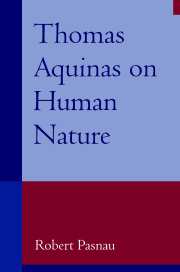Book contents
- Frontmatter
- Contents
- List of Abbreviations
- Acknowledgments
- A Note to the Reader
- Introduction
- PART I ESSENTIAL FEATURES (QQ75–76)
- PART II CAPACITIES (QQ77–83)
- 5 The soul and its capacities
- 6 Sensation
- 7 Desire and freedom
- 8 Will and temptation
- PART III FUNCTIONS (QQ84–89)
- Epilogue: Why Did God Make Me?
- Notes
- Bibliography
- Appendix: Outline of the Treatise (ST 1a 75–89)
- Index
7 - Desire and freedom
Published online by Cambridge University Press: 05 June 2012
- Frontmatter
- Contents
- List of Abbreviations
- Acknowledgments
- A Note to the Reader
- Introduction
- PART I ESSENTIAL FEATURES (QQ75–76)
- PART II CAPACITIES (QQ77–83)
- 5 The soul and its capacities
- 6 Sensation
- 7 Desire and freedom
- 8 Will and temptation
- PART III FUNCTIONS (QQ84–89)
- Epilogue: Why Did God Make Me?
- Notes
- Bibliography
- Appendix: Outline of the Treatise (ST 1a 75–89)
- Index
Summary
Everything that has a form has an appetite, but appetites come in different kinds. Natural appetites are fixed by nature, and determine their possessor to the pursuit of a certain end. An end is pursued only if it exerts some causal influence on the pursuer, the influence of final causality, and this requires some sort of cognitive grasp of the end. Hence natural appetites imply an intelligent creator (§7.1). Voluntary agents can determine their own appetites, by gathering information about the world around them. Lower animals meet this standard, and in a sense they can even be considered free agents (§7.2). But genuine voluntariness, and genuine freedom of choice, requires rationality. Indeed, human beings have free choice precisely because we have the capacity to deliberate rationally about the judgments we make (§7.3). Aquinas's account of freedom implies that one can still choose freely, even if one's choice is causally determined. We are in control of our choices so long as our judgments are subject to prior judgments, and our choices subject to prior choices (§7.4).
Natural appetite
Of the human soul's various capacities, only two – intellect and will – distinguish us as human. Aquinas quotes with approval John Damascene's remark that we are made in the image of God in virtue of being “intellectual, free in our decisions, and capable on our own” (1a2ae pr). The latter two of these characteristics depend on the capacity of will. Although much of the Treatise is devoted to intellect, and although Aquinas returns later in ST (1a2ae 6–17) to a discussion of the will, he could hardly have surveyed human nature without at least touching on our so-called rational appetite.
- Type
- Chapter
- Information
- Thomas Aquinas on Human NatureA Philosophical Study of Summa Theologiae, 1a 75-89, pp. 200 - 233Publisher: Cambridge University PressPrint publication year: 2001



